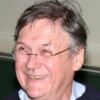Tim Hunt

Tim Hunt
Sir Richard Timothy Hunt, FRS, FMedSci, FRSEis a British biochemist and molecular physiologist. He was awarded the 2001 Nobel Prize in Physiology or Medicine with Paul Nurse and Leland H. Hartwell for their discoveries of protein molecules that control the division of cells. In particular, Hunt discovered what he called cyclin: a protein in fertilised sea urchin eggs which cyclically aggregates and is depleted during cell division cycles...
NationalityBritish
ProfessionScientist
Date of Birth19 February 1943
nobel physiology prize punches
Winning a Nobel Prize isn't about being clever at all. It's about making... at least in physiology or medicine, it's about making discoveries, and you don't have to be clever to make a discovery, I don't think; it just comes up and punches you on the nose.
anyone hard nobel scientist works
Anyone can win the Nobel Prize if the scientist works hard on his research subject.
absolutely best conversation entire france great meeting minutes prepare speaker
The best meeting I ever went to was a meeting in France where the talk slots were 60 minutes long, but you were told to prepare a five-minute talk. It was absolutely great because the entire talk was a conversation between the speaker and the audience.
afternoon cell cycle given john provided scholarly seminar
My introduction to cell cycle control was provided by a clear, scholarly and beautiful seminar given by John Gerhart one afternoon in the summer of 1979.
comfort emails great helping inspiring record science scientists supporting thank top touching women
My inbox is now bulging with touching emails from young women scientists who have been kind enough to write and thank me for inspiring them and helping them on their way. It has also been of great comfort to me to see many women at the top of science testifying for my record in supporting women scientists.
age attended dangerous department dragon education girls high home imagine latin moving oxford reason school taught
My education started with Latin taught at home by a governess, I can't imagine why, and for some reason I attended the Infants Department of the Oxford High School for Girls before moving to the Dragon School at the dangerous age of 8 or so.
absolute burst criticise hold ideas means tend terribly truth
It's terribly important that you can criticise people's ideas without criticising them, and if they burst into tears, it means that you tend to hold back from getting at the absolute truth.
biological careers colleagues developed excellent left problems proud respect scientists tackling tried whoever
In my own career, I have always tried to treat my colleagues with respect and kindness, whoever they are, and am proud to have developed and mentored the careers of many excellent young scientists who will be tackling tomorrow's biological problems long after I have left the scene.
albert cambridge chairman department einstein left work york
In 1968, I left Cambridge and went to work in New York with Irving M. London, who was then the chairman of the Department of Medicine at the Albert Einstein College of Medicine.
far hunt lecturer liverpool richard william
I was born in 1943 at Neston in the Wirral, not far from Liverpool where my father, Richard William Hunt was a lecturer in paleography, the study of mediaeval manuscripts.
disruptive fallen lab love people playing science terribly
I have fallen in love with people in the lab, and people in the lab have fallen in love with me, and it's very disruptive to the science because it's terribly important that, in a lab, people are on a level playing field.
academic ask bothered cannot country dry hoped hung promote science side
I had hoped to do a lot more to help promote science in this country and in Europe, but I cannot see how that can happen. I have become toxic. I have been hung to dry by academic institutes who have not even bothered to ask me for my side of affairs.
certainly horrible portrayed recognise sexist throughout women worked
I certainly don't recognise myself as the horrible sexist portrayed in media reports, and I don't think the women who have worked with me throughout my career do either.
experience good moments normally rare several takes tease truth weeks
'Eureka' moments are very, very rare in my experience. It normally takes several weeks of experiments to tease out the truth, even when you have a really pretty good idea of what is going on.